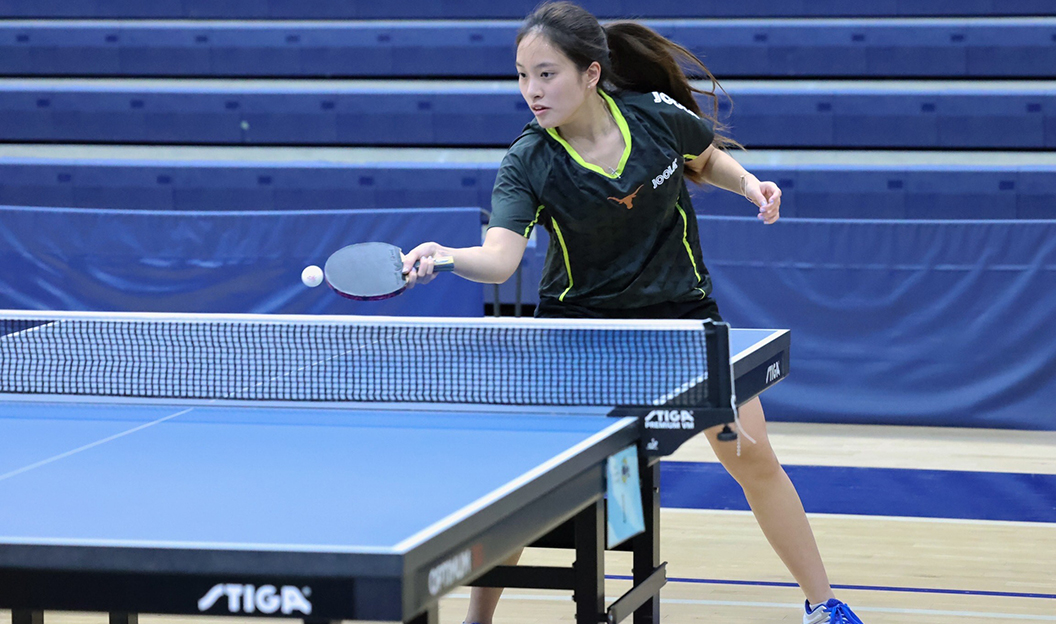
By Tess Harmon, Photo by Grant Bergmann
In her first year as the captain of the UT Austin table tennis team, Kelly Zhao brought more than 10 years of experience and her dedication to the sport as she discovered what it takes to lead a collegiate-level team. Zhao started playing table tennis at 7 years old after watching her father and peers have fun with the sport. By the time she was in high school, Zhao was playing at a competitive level. Though she moved to Dallas as a child, Zhao is a Canadian citizen and in 2015, joined the Canadian National Team, for which she played until 2020.
Now entering into her third year at UT, Zhao has been playing for the university’s club table tennis team since her freshman year and was the team’s captain this past year. Zhao led the team through divisionals, regionals and nationals, all the way to the round of 16 of the national tournament.
In her role as captain, Zhao learned a lot from a new leadership position within a sport that she already knew so well. Zhao shares the four most important lessons that she learned while leading a successful collegiate club table tennis team.
Step up and take responsibility.
There are two sides to my role: I’m captain and also the president of the club. There are a lot of administrative tasks involved and outreach, such as talking to team members and making sure they are enjoying their time. I have to figure out how to get the team to and from competitions, book a hotel, get us food, arrange the schedule and ensure that the team is having a good time. I don’t naturally take on leadership positions, and I usually let other people make decisions. This last year was really important for me to accept these new responsibilities.
Failure and mistakes are necessary.
Especially early on when I started in this role, I was unsure and I made a couple of mistakes. These were mostly on the administrative side and doing outreach for the club. But I think it was necessary for me. By nationals, I was a lot more comfortable in the position, and mistakes happen. In our club, there were other officers to help me, which was important in doing outreach and getting information to members. I did a lot of the work on the tournament side of things and made a lot of mistakes at the beginning, but I got the hang of it by the end of the year.
Find a balance.
This past year, I was balancing sports, school and my own extracurricular activities. I study neuroscience, which has a heavy workload, so I had to choose my priorities. I’d always prioritize tournaments and special events. I would pre-plan those weekends to ensure I had no other responsibilities so that I could fully dedicate myself. On normal days during the school year, I would put my studies first because the classes that I was taking last year were especially hard. So, if I had an upcoming test that I really needed to study for, I would have the other officers go to the practices. That actually taught me a lot, and I made sure that I wasn’t overwhelmed. Creating a schedule is really helpful. Whenever I felt that the club was taking up too much time, I would delegate to the other officers and take a step back to gather myself.
Cultivate team spirit.
Even though table tennis is typically an individual sport, there is still a lot of team spirit involved in college sports since we’re all playing as a team. There are some tournaments where members will play by themselves and the others won’t watch, and it feels like they’re not as much of a team. In those situations, the mood is not as good and players don’t do as well, versus when all of us are together, we stay together and we cheer for each other. We just have a lot more team spirit, and the players are a lot more eager to play, not just for themselves but also for our team.
I notice it with other schools too; all of the best schools in the U.S. fight for each other, push each other and cheer for each other. As captain, I get people together to watch and cheer for our teammates. Since we’ve all practiced together, everyone is really close.

